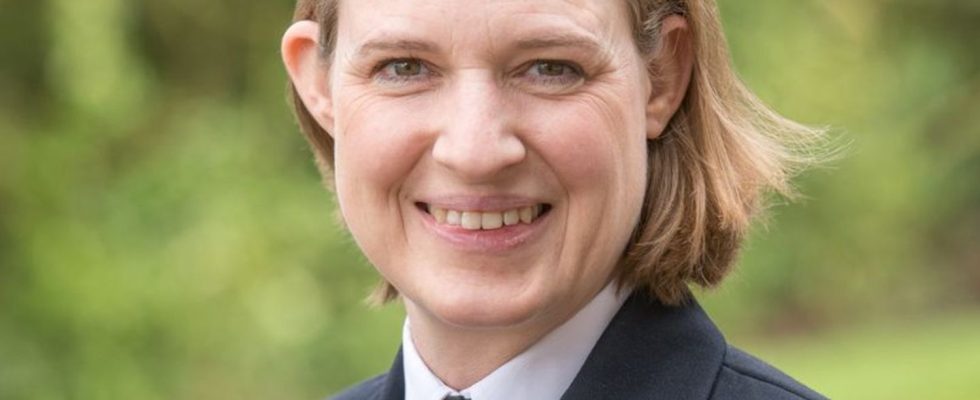defense
For the first time, a woman leads a naval combat unit
Follows Frigate Captain Carsten Schlüter as commander: Inka from Puttkamer. photo
© Bundeswehr/Navy/dpa
Inka von Puttkamer is the new commander of the 3rd minesweeping squadron in Kiel. This makes her the first woman to head a naval combat unit. Seafaring runs in her family.
Along with another female soldier, she was already the first woman to become a commander in the Navy. In Kiel she was commander of the minehunter “Homburg” and deputy commander of the 3rd minesweeping squadron.
Von Puttkamer is the mother of three children. The 41-year-old, who was born in Wilhelmshaven, also wants to be a role model in her new role. When she joined the Bundeswehr in 2001, all career paths were open to women for the first time, said von Puttkamer. “But for me and for everyone else it was normal.” This shouldn’t be anything special in the Navy today. “I find it difficult that being a woman is always highlighted.”
“The Bundeswehr offers my husband and I the opportunity to be in leadership positions and to be able to combine that with the family,” said von Puttkamer. “Without question: It’s stressful and requires a lot of organization and pre-planning. But it’s possible.” She wants the change of command to be accompanied by the message that the Bundeswehr enables women to take on such positions.
Family naval tradition
Von Puttkamer was most recently at the NATO maritime headquarters in Northwood. She will return there by summer. “For now, I will still be living in Great Britain to enable our children to finish the school year there,” she said. She wants to move to Kiel in the summer. “We have our family home here and we also have family support here.”
The von Puttkamers family has a great naval tradition. Her father Ingo Splettströmer is a retired sea captain. Her husband Bogislav-Jesko von Puttkamer is a frigate captain and is expected to take command of a frigate in Wilhelmshaven in the coming weeks. Her father-in-law Hubertus von Puttkamer is a retired flotilla admiral.
The squadron includes ten minehunters. Soldiers recently discovered a 1.8-ton British air mine during an exercise in the Kiel Fjord. According to police, it was the largest unexploded bomb from the Second World War ever found in Schleswig-Holstein. On Tuesday, experts from the explosive ordnance disposal service recovered the so-called blockbuster and defused it on a floating pontoon.
First female commander of a naval battle group
“There is a lot to do, especially for the Navy’s mine countermeasures unit,” said the commander of Operational Flotilla 1, Flotilla Admiral Sascha-Helge Rackwitz. He is proud and happy to be able to trust in such an energetic and competent colleague. The first female commander of a combat unit has proven over the years that she is one of the best in her field. It is time to use a woman in this role to show that there are no limits and no glass ceilings in the Bundeswehr.
Von Puttkamer succeeds frigate captain Carsten Schlüter (43) as commander. “It is more than difficult for me to hand over the third minesweeper squadron today,” he said as he said goodbye after 18 months. The incidents with the Nordstream pipelines have brought the topic of underwater warfare back into focus. “This meant that the topic of mines could finally be freed from its niche existence of the last few years.” It must be clear to everyone that the Navy still has a lot of homework to do in this area. “But things are moving.” He moves to the naval command in Rostock as adjutant to the naval inspector.
His successor spoke of an honor to now lead the association. “On the other hand, this obviously means a prominent position for me in these times because defense and security have become very important again in the last two years.” She feels well prepared. Sea travel is always dangerous because the crew is always on duty from the moment they set sail. “Because everything that happens is sharp. That’s the special thing about seafaring.” She particularly enjoys managing people.
She will continue to go to sea from time to time, said von Puttkamer. On the one hand, it was about getting to know the crews. But she will also be present at squadron exercises, always at special events.
According to the Bundeswehr, there are currently 24,418 female soldiers in the armed forces. At 13 percent, this is still a comparatively small proportion. There are 6,950 female officers. There are 1,728 women serving in the Navy, significantly fewer than in the Army (4,673) and the Air Force (2,632).

